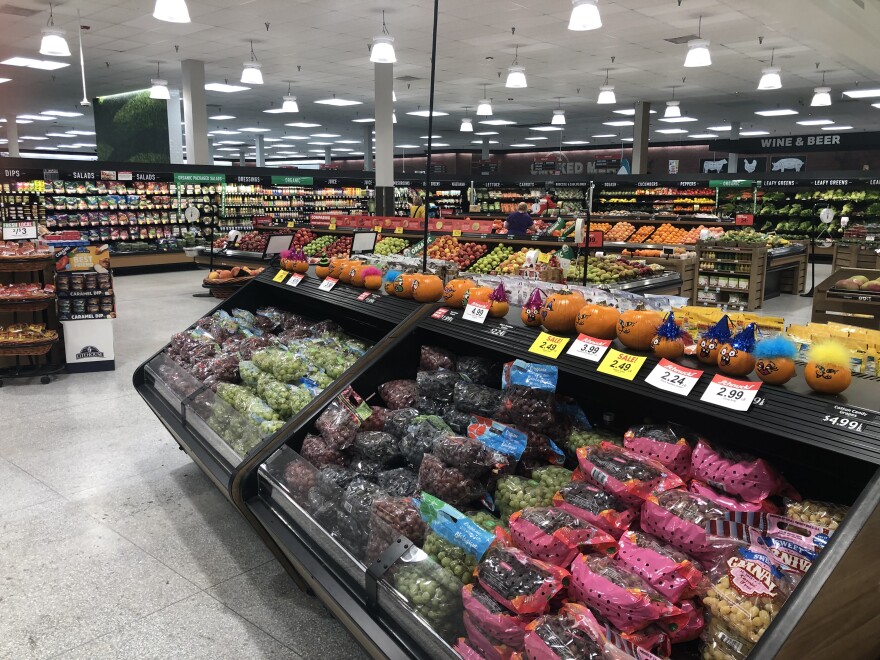A key indicator of inflation is at its highest level since 1982.
The Bureau of Labor Statistics says the Consumer Price Index increased by nearly 7% in November, compared to a year earlier.
The index covers the cost of a wide range of goods and services including gasoline, food and pet supplies.
As the economy responds to the pandemic, St. Louis Public Radio’s Wayne Pratt spoke with Washington University economics professor John Horn about what is driving prices higher.
Wayne Pratt: Is this all pandemic related?
John Horn: I would say majority pandemic related.
It's sort of a confluence of a few things. The increased demand for products at the same time, it's harder to get them because of the supply chain problems that leads to higher prices.
I think the part that's not necessarily pandemic related, actually, it's a remnant from the last financial crisis, 10 years ago, is that at the time the Federal Reserve had increased the money supply to help cushion the economy. And that has continued ever since and combined with the availability of the income to go buy things, having a lot of excess money in the economy also tends to drive prices higher.
Pratt: The higher prices — it's hitting all sectors?
Horn: It's not actually.
If you look at airline prices are still well below what they were at the beginning of the end of 2019. Some things have gone up. I think I was just reading today though, that gas prices and natural gas futures are going down. That is sort of pandemic related, but that's also partially choices by OPEC to stop producing as much. I think the thing that's challenging when we think about inflation is we hear that overarching number of, you know, 6% change or 5-and-a-half percent, we think that everything's gone up by 5-and-a-half percent or 6%. And it hasn't. Some things like used cars and new cars are going through the roof.

Other things are growing, you know, sort of the 2% they normally really have. And some things are actually lower prices.
Pratt: So does that suggest that maybe this is a blip?
Horn: I tend to think it is still, even though, you know, there are a lot of really smart economists who are saying no, it's systemic.
The reason I keep going back to why I think it's more likely to be a blip is that when I think about inflation, when I look at the five or 6% consistently going up over time, it means that next year prices will go up by another 5 or 6%. And for that really to happen, you've got to believe that the cost of production is gonna go up by another 5 or 6% or something similar, to get the prices to keep going up.
And typically in economics, we think about that because wages keep going up. The wages go up, which means I have to charge higher prices, which means wages go up because many workers need higher wages to pay for the higher prices, etc. Call me skeptical. I just have a hard time believing that yes, while the labor market is tight right now that firms and businesses are gonna continue to keep giving 5, 6, 7, 8% wage inflation.
Pratt: Is there evidence now that those wages are on an upward trend?
Horn: Yeah. Wages have gone up, especially at the lower end of the spectrum. And if you look at certain types of industries or classes of jobs, some of the lower skill service sectors have really had to compete to get workers because there just aren't as many of them.
Pratt: How do you see this all playing out, say in the next couple of months, within the next year?
Horn: I can tell a really compelling story that inflation is gonna be 5 or 6% for the next couple of years until the Fed decides to put a hopefully mild recession in place to kill that inflation.
I can also tell a really compelling story that by the middle of next year, it's gonna tamp back down to like maybe 3% on its way back down to sort of the normal 2% we've had the last couple decades.
For what's going to determine that - I don't want to say it's all pandemic related, but I think the uncertainty in the shocks that have been hit because of the pandemic, if those start to work their way out and we sort of get back to a more normal way in functioning, I have a hard time seeing inflation staying that high if we do sort of fix some of those supply chain types of issues and see some prices sort of stabilizing, because there's not the constraint of actually getting the things we want.



